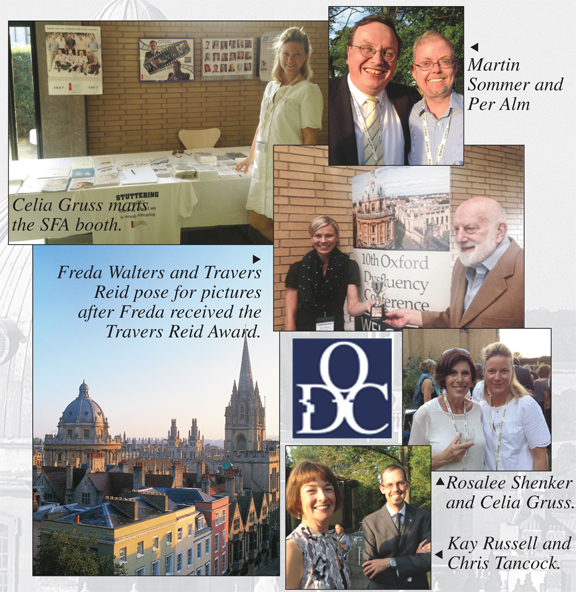By Ellen Kelly, Ph.D., Vanderbilt University
 One hundred ninety-two delegates from 32 countries met in Oxford, UK, marking 30 years since the first Oxford Dysfluency Conference (ODC) in 1984. Several age-defying attendees of this year’s conference also were present at the inaugural conference. Co-chairs, Sharon Millard, The Michael Palin Centre for Stammering Children, UK, and Dave Rowley, De Montfort University, UK, and their scientific committee, provided a varied program on topics pertaining to dysfluency assessment, treatment, and including both basic and applied research findings.
One hundred ninety-two delegates from 32 countries met in Oxford, UK, marking 30 years since the first Oxford Dysfluency Conference (ODC) in 1984. Several age-defying attendees of this year’s conference also were present at the inaugural conference. Co-chairs, Sharon Millard, The Michael Palin Centre for Stammering Children, UK, and Dave Rowley, De Montfort University, UK, and their scientific committee, provided a varied program on topics pertaining to dysfluency assessment, treatment, and including both basic and applied research findings. The conference venue provided opportunities for learning and lively discussion in both formal and informal settings. Clinicians and researchers alike feasted on information that will enhance their work.
Keynote speakers included Soo-Eun Chang, U. of Michigan, USA, Jan McAllister, U. of East Anglia, UK, Henny-Annie Bijleveld, U. Libre de Bruxelles, Belgium, Brenda Carey, U. of Sydney, and La Trobe, U. Australia, Marie-Christine Franken, Caroline de Sonneville-Koedoot and their colleagues (Netherlands), and an international panel seeking a consensus approach to evaluating treatment outcomes from Croatia, Australia, Germany, the UK, and Iran.
Topics ranged from brain network connectivity in children who stutter to treatment methods – those for Adults Who Stutter (AWS) incorporating behavioral, cognitive and emotional factors, and, at the other end of the age range, a comparison of two seemingly contradictory approaches to early intervention with Children Who Stutter (CWS).
Delegates were treated to an intriguing diagnostic journey with an AWS suffering Posttraumatic Stress Disorder (PTSD) that rivaled any Sherlock Holmes mystery and exposed to new frontiers in technology to enhance intervention. The conference concluded with presentation and discussion of a proposed one-item measure of communication effectiveness with potential application across every type of treatment for People Who Stutter (PWS) of all ages.
As a first-time attendee, I was particularly struck by the unified desire of the attendees, sometimes with disparate points of view, to work together and learn from one another to advance our knowledge and the quality of our services to those who stutter.
Master’s and doctoral students from around the world presented their research, with some competing for the coveted Travers Reid Award. The judges selected Freda Walters, U. of Cape Town, South Africa, in recognition of her ambitious and impactful study, “Classroom-based intervention to change peers’ attitudes toward children who stutter: A feasibility study.”
One of the many highlights was a Stuttering Foundation T-shirt that was signed by a variety of delegates and presented to the conference organizers as a token of remembrance and appreciation. Unspoken, of course, but perhaps a not-so-subtle invitation to shoulder the task, once more, in 2017!
From the 2014 Fall Newsletter






 Podcast
Podcast Sign Up
Sign Up Virtual Learning
Virtual Learning Online CEUs
Online CEUs Streaming Video Library
Streaming Video Library